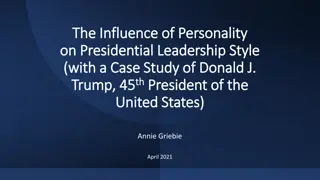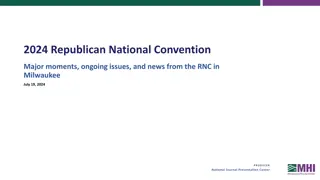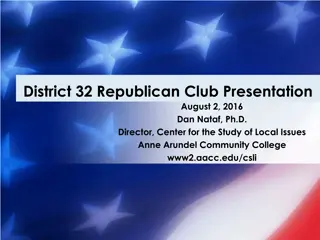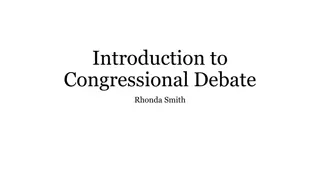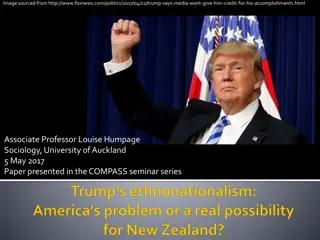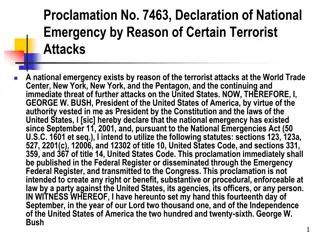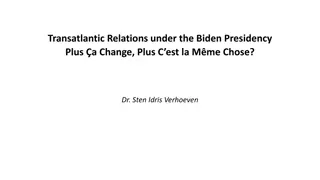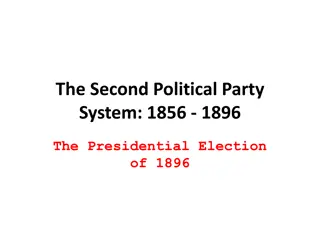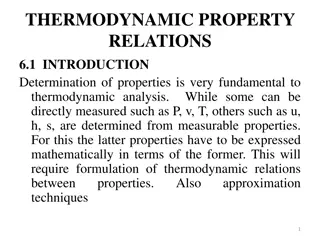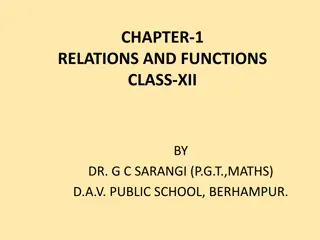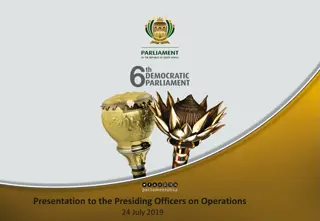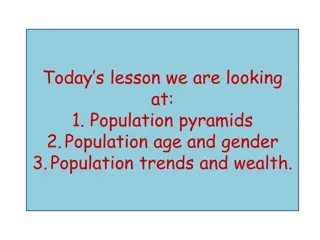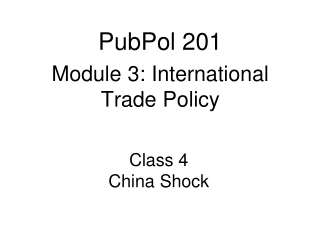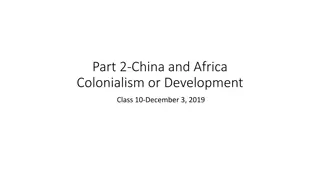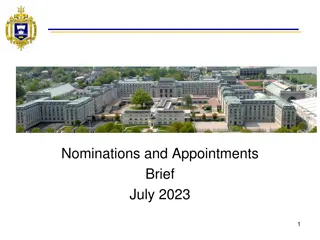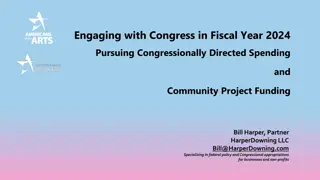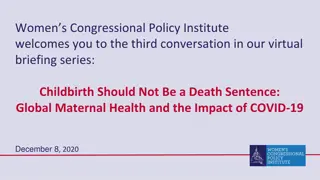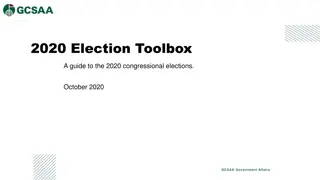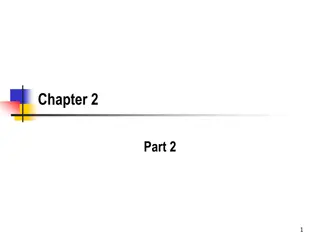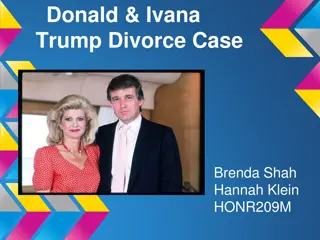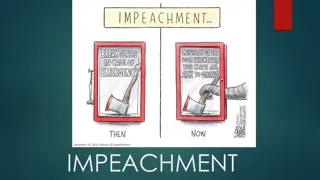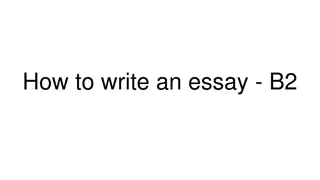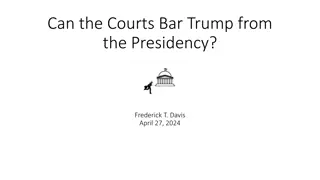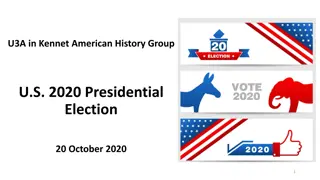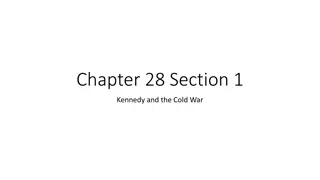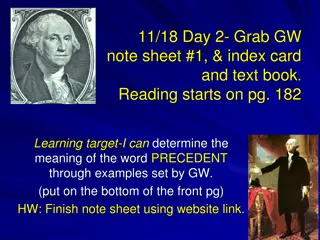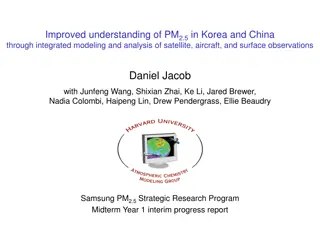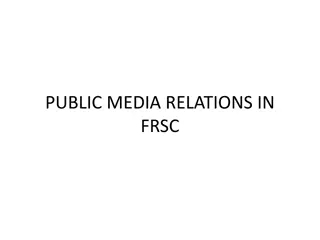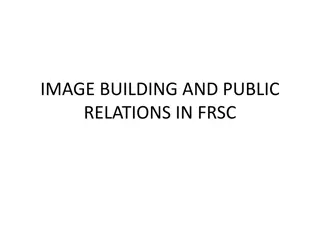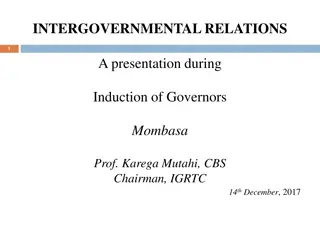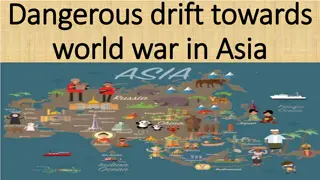US-China Relations in the Trump Administration: Unilateral Presidential Actions and Congressional Dynamics
The article discusses the evolving US-China political and economic relations during the Trump administration, focusing on unilateral presidential actions, Congress's role, and the influence of the federal courts. It highlights President Trump's aggressive trade agenda, challenges to his reliance on national security justifications, and the implications of congressional delegation of trade authority. The partisan makeup of Congress, judicial deference to executive powers, and the role of the federal courts in reviewing presidential actions are also analyzed in the context of the US-China dynamic.
Download Presentation

Please find below an Image/Link to download the presentation.
The content on the website is provided AS IS for your information and personal use only. It may not be sold, licensed, or shared on other websites without obtaining consent from the author. Download presentation by click this link. If you encounter any issues during the download, it is possible that the publisher has removed the file from their server.
E N D
Presentation Transcript
United States-China Political and Economic Relations in the Trump Administration Mark J. Rozell Dean Ruth D. and John T. Hazel Professor of Public Policy Schar School of Policy and Government George Mason University (USA)
Unilateral Presidential Actions U.S. system of separated powers formally limits the president s ability to act alone. The U.S. Constitution grants one unilateral presidential power pardons and reprieves. Since about mid-twentieth century there has been a steady rise in the exercise of unilateral presidential actions in national security and foreign affairs more generally, due in part to legislative acquiescence and judicial deference. As trade and national security have grown in importance as domestic issues in the U.S., President Trump has relied on (1) Congress s broad delegations of trade authority to the president and (2) past expansions of presidential authority in foreign affairs to set an aggressive trade agenda.
The President Acts, Congress Acquiesces The U.S. Constitution makes it clear that no branch of the national government may delegate its constitutional powers to another branch. Congress has been doing exactly that in matters of war powers, foreign policy, and trade policy. Litigation filed in U.S. Court of International Trade contends that broad delegations of congressional trade authority to the president are unconstitutional. The suit claims that Congress has delegated away its legislative power by not establishing sufficient criteria for executive action. The Constitution anticipates that each branch of the government will protect its own powers against encroachments by another branch. Congress has not upheld its side, leaving it either to presidents to respect limits on their powers (not realistic) or the courts to intervene. Given the partisan makeup of Congress right now both houses controlled by the Republicans - it is unlikely that it will act to restrain the president. And there is little chance of the courts acting as a corrective.
The Role of the Courts Only the federal courts can meaningfully review and reverse presidential exercises of powers if Congress won t act. The trouble is, the courts have not upheld the non-delegation doctrine for years and have generally sided with presidents in the exercise of broad discretionary powers. The Supreme Court is dominated by Republican appointees, including a likely two vacancies filled by President Trump. In the recent Supreme Court case upholding the immigration ban, the Court majority refused to look beyond the broad statutory language and the Trump Administration s reliance on a national security rationale, leaving aside even the president s past derogatory comments about Muslims and calls during the 2016 campaign to ban them from entering the country.
Trump and Presidential Trade Authority President Trump s reliance on national security as a rationale for aggressive trade actions is unprecedented. The WTO and U.S. federal court court cases have challenged the president s reliance on Section 232 of the Trade Expansion Act and its authorization for trade actions on the basis of national security reasons (aluminum and steel). The EU, China, India, Canada, Mexico, and Russia (complainants in the WTO) maintain that under global trade law, the U.S. actions are not based on valid national security concerns, but that the true objective is protectionist policies. The president is claiming national emergency powers to restrict foreign direct investment in the U.S. and enact export controls for regulating outward investment and technology transactions.
Trump on Treaties and Multilateral Arrangements Withdrew from Trans-Pacific Partnership Withdrew from Paris Climate Accord Withdrew from Iran nuclear deal Withdrew from U.N. Human Rights Council Renegotiating NAFTA Threatening to withdraw from WTO Threatens U.S. allies in European Union as well as Canada and South Korea over tariff issues; U.S. alliances in tatters.
Trump and Trade Policy President s actions have brought the international system to the verge of a trade war. President s policies and actions on trade deficits and on bilateral trade and his moving the U.S. away from the post-WWII international system are aberrations for an American president since 1945. Nonetheless, his actions are rooted in a long-standing clash of domestic interests in the U.S. going back many years. Domestic sources of support for his actions are important to understand current U.S. policies and actions.
The U.S. Domestic Context The president has long criticized what he perceives as unfair and one-sided trade relationships that harm U.S. manufacturing sectors. Part of his political appeal in 2016 was his claims that he could revive declining manufacturing industries affected by globalization, bad trade deals ; that foreign countries were taking advantage of the U.S. and harming U.S. industries. Trump said he would end the U.S. trade disadvantage with China and other countries. Trump succeeded in peeling off many traditionally Democratic voters in in manufacturing regions of key Midwest and upper-Midwest states that delivered his unlikely Electoral College victory. Trump needs to retain this political support for the midterms and also for his 2020 reelection prospects. Midterm elections 2018: 435 House seats and 35 of 100 Senate seats. Of 35 Senate races, nine currently held by Republicans. Democrats need to flip two to win Senate majority. Only one of the nine states voted for Hillary Clinton in 2016. Democrats need 24 more seats in the House to become the majority. GOP holds 33 of the 36 toss-up districts. In addition, six Republican-held districts are likely to elect Democrats. House more likely than Senate to flip.
Political Costs to Trump of Trade Conflict with China? Midterms loom large for Trump; losing GOP majorities in Congress will escalate investigations and stall his agenda. Targeted tariffs by China costly to Trump country ; that may cost the president and the GOP some political support. But mostly these are agricultural states and solidly Republican. Brookings report: Industries most affected: plastics products manufacturing, aircraft manufacturing, pharmaceutical preparation manufacturing, fruit and nut tree farming, animal slaughtering. Toss-up states for Senate seats affected by China tariffs: Indiana, Missouri, West Virginia, Tennessee, North Dakota, Nevada, Arizona. Industry opposition may not translate into electoral pressure since economic impact will not be immediate. Trade/economic issues may not drive voters preferences given other heated issues (immigration, abortion, gun control, etc.).
Do you approve or disapprove of the way Trump is handling international trade? Do you feel that way strongly, or somewhat? 45% 40% 40% 35% 35% 30% 30% 25% 25% 20% 20% 15% 15% 10% 10% 20% 16% 23% 15% 25% 25% 34% 39% 5% 5% 2% 1% 0% 0% Strongly Approve Somewhat Approve Somewhat Disapprove Strongly Disapprove No Opinion Battleground Non-battleground Overall Washington Post-Schar School Poll, June 27 - July 2, among 1,473 adults
Partisan views on free trade agreements and tariffs "Raising tariffs on steel and aluminum would be a __ thing for the U.S." "Free trade agreements have been a __ thing for the U.S." 70% 70% 60% 60% 56% 50% 50% 45% 40% 37% 40% 30% 30% 20% 30% 17% 10% 20% 14% 0% 10% Bad Good Don't know Republican/Republican leaning 0% Democrat/Democrat leaning Bad Good Don't know Total Pew Research Center survey, April 25-May 1, among 1,503 adults
Public trust of two parties on trade issue changes over time Which party would do a better job dealing with trade agreements? 50% 45% 40% 35% 30% Apr 2016 Oct 2017 Jun 2018 Republican Party Democratic Party Pew Research Center for the People & the Press Poll, April 2016, October 2017, and June 2018
Business Group Opposition to Trump Trade Policies U.S. Chamber of Commerce details costs of trade war with China to each of the states and activates members to pressure Congress and White House. 45 trade associations (agriculture, IT, transportation, retail, light manufacturing) pressure Trump to seek alternative approaches to address China s trade and investment policies; e.g., working through U.S. allies. U.S. companies worry about costs to consumers, disrupting supply chains, loss of access to markets in China; and that China may both impose tariffs and punish foreign businesses operating in China.
But Its Not All Just About Trade On the surface, trade war is about bringing the bilateral trade relationship to balance, reducing U.S. trade deficit to China. Restoring balance to bilateral trade is not realistic, but a key political message for Trump nonetheless. Trade war likely linked to larger U.S. strategy under Trump to slow China s rise and reaffirm U.S. dominance in the global system. Trump sees the illegal acquisition of intellectual property and technology transfer as threats to the U.S. national security. The Trump Administration s National Security Strategy report in December 2017 cited China as a direct threat to U.S. economic security an integral part of U.S. national security. The first time intellectual property theft was cited as a national security issue; Trump integrates economic and national security.
National Security Strategy Report Every year, competitors such as China steal U.S. intellectual property valued at hundreds of billions of dollars. Stealing proprietary technology and early- stage ideas allows competitors to unfairly tap into the innovation of free societies. Over the years, rivals have used sophisticated means to weaken our business and our economy as facets of cyber-enabled economic warfare and other malicious activities. In addition to these illegal means, some actors use largely legitimate, legal transfers and relationships to gain access to fields, experts, and trusted foundries that fill their capability gaps and erode America s long-term competitive advantages.
More Critical Reports March 2018: U.S. Trade Representative Office report criticizes China s practices in technology transfer. June 2018: White House Office of Trade and Manufacturing Policy report How China s Economic Aggression Threatens the Technologies and Intellectual Property of the United States and the World. Report language highly condemnatory, accused China of seeking to acquire technology and intellectual property through: (A) State-sponsored IP theft through physical theft, cyber-enabled espionage and theft, evasion of U.S. export control laws, and counterfeiting and piracy; (B) coercive and intrusive regulatory gambits to force technology transfer from foreign companies . (C) economic coercion .. (D) methods of information harvesting and (E) State-backed, technology-seeking Chinese investment.
Thus Making Negotiating More Complicated The above quotation makes it clear that the administration doesn t see just corporate malfeasance but also practices that are rooted in the Chinese state s overall economic strategy. Addressing these problems won t happen through trade negotiations, but would require fundamental changes to China s economic and political systems. Trump s trade war may be about much more than trade imbalances, as he seeks to address perceived strategic disadvantages resulting from China s industrial policies and trade practices, especially in the key sectors of advanced manufacturing and technology. Therefore, criticism from economists about economic irrationality of trade wars is unlikely to change Trump s mind.
Chinas Dilemma China s leaders used to see Trump as a pragmatic businessman who they can make deals with. But if Trump s goal is not just reducing the trade deficit, but rather to weaken China structurally, there is hardly any transaction to make. The political and economic structure of another country is not a basis for negotiations. Trump likely delayed his aggressive posture due to the North Korea crisis in the hope that China would facilitate U.S. efforts. Once Trump understood that China s influence over North Korea is limited, he proceeded with his trade war; Trump now has less hesitancy to try to push China.
Trumps View of China In 2000 book, Trump called China our biggest challenge and in 2015 book as a matter of American global strategy, we want to take away China s advantage . Key adviser on China trade policy is Peter Navarro (director of Office of Trade and Manufacturing Policy), an economist who is not a China expert but he turned his focus to China when he saw his business school students losing jobs to foreign competition. The titles of his books are all telling: The Coming China Wars (2006). Death by China: Confronting the Dragon A Global Call to Action (2011). Crouching Tiger: What China s Militarism Means for the World (2015).
Navarro on China Reflecting Trumps View Currency manipulation abusive trade policies deadly consumer products Detriment to the global trade system and U.S. national interests. Navarro is dismissed by most of his professional colleagues as a polemicist writing about a country he doesn t understand, but his appointment reflects Trump s tendency to appoint advisers not based on expertise but rather share the president s own outlook.
Policy of Confrontation, Not Cooperation In fairness to Trump, many China experts in the U.S. increasingly have moved to the view that the U.S. approach in the past was too accommodative; that the belief that engagement with China and bringing China into the global trade system would lead to a somewhat liberalized China was simply wrong. China too made assumptions about the U.S. that Trump has upended; that the U.S. would uphold its alliances and the post- WWII system it built and that has benefited China in many ways; that the U.S. would continue to pursue trade negotiations through multilateral channels. China now is trying to figure out how to respond to the new reality in the U.S. of a unilateral trade approach under Trump. And Trump s utterances on China cause confusion as he moves from confrontational language to calling China s leader his great friend with who he has a great relationship .
No Easy Way Out Trump not persuaded by public opinion or views of experts; he seems committed to a course of action leading to a collision of interests. U.S. loses economically, but China likely loses even more with a trade war. U.S. exports to China much smaller than Chinese exports to U.S.; Chinese exports are 20% GDP, U.S. exports 12%. Capital markets stronger in the U.S. than China right now. Tariffs on U.S. agricultural products will drive inflation in China; China eager to call off a trade war and Trump knows it; Trump the deal-maker thinks he has the upper-hand; Chinese official media claims of the country being prepared for a trade war dismissed by the administration as bluffing. Chinese people, proud of the country s economic advances, would find it difficult to accept China caving to U.S. pressure; nor would that look good for the Chinese supreme leader who, having just been granted an unlimited term, would appear suddenly weakened at the hand of Trump. All of which suggests no easy way out of this mess.
Thank you! Questions? Questions?


